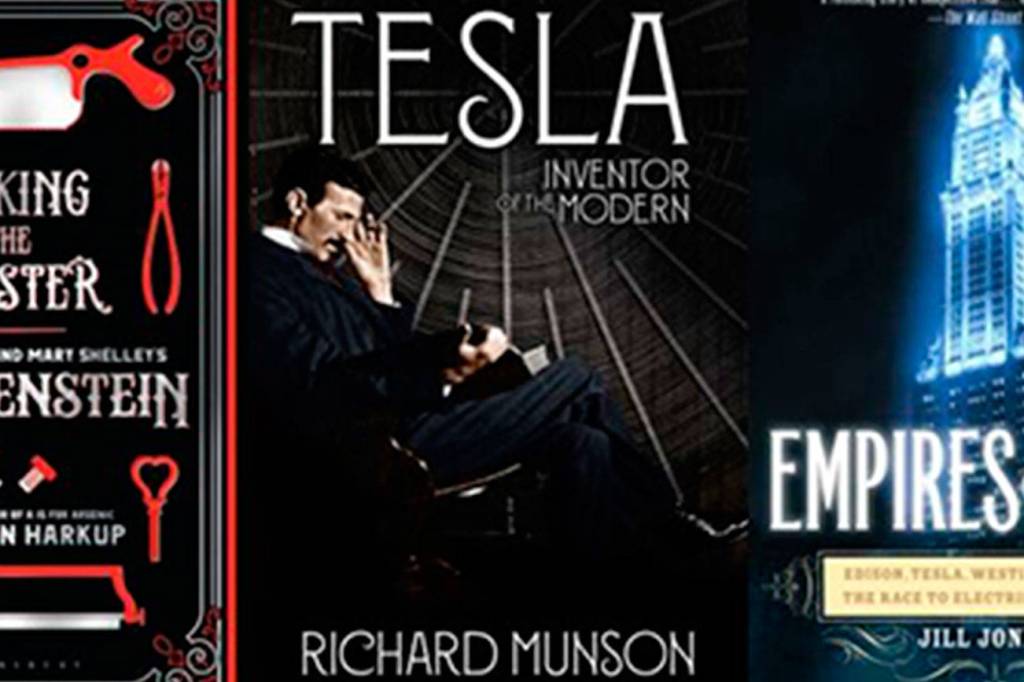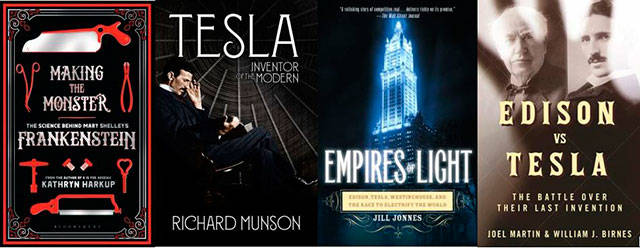These books reveal the majesty and mystery of electricity
Published 1:30 am Friday, June 22, 2018


By Richard, Everett Public Library staff
I’ve always been a big fan of science, but to be honest I don’t always get it. Perhaps it comes from being a humanities major, or simply the limits of this Homo sapiens brain capacity, but after a certain threshold I have serious trouble comprehending certain concepts. Newtonian physics seems to be my limit: Force equals mass time acceleration? Got it. Once you start talking quantum mechanics things start to go off the rails: An object can be in two places at the same time? Sorry, my mind just exploded. In Star Trek terms, I suffer from Khan’s weakness for two-dimensional thinking and share Captain Janeway’s dislike of time travel.
One of the scientific ideas that I can actually comprehend and enjoy is electricity. While it might seem basic and thoroughly rational today, when electricity was first discovered it had a whiff of the magical about it. Eccentric inventors harnessing an unseen force that traveled through wires generating light, power and a potentially lethal charge was hard to resist. To judge by the number of books still being written about the discovery and harnessing of electricity, the interest continues to this day. Here are a few titles that you might also find enlightening as well as entertaining:
Making the Monster: the Science behind Mary Shelley’s Frankenstein by Kathryn Harkup
Can an electrical current actually reanimate a corpse? Well, no, but a defibrillator sure comes in handy when someone is having a heart attack. While the science reflected in Mary Shelley’s classic work may not stand up to modern scrutiny, the core concepts are surprisingly sound. It is clear that Shelley had an excellent knowledge of the scientific ideas percolating in 1818 relating to electricity and physiology. In this work, Harkup gives the reader an intriguing and entertaining overview of the often gruesome and peculiar scientific endeavors that Shelley drew on for her famous novel. Just in time for its 200-year anniversary.
Simply Electrifying: the Technology that Transformed the World by Craig Roach
Providing a well-written overview, Roach tells the story of the discovery, harnessing and regulation of electricity in its 200 plus year history. It is a story that involves many different aspects including science, technology, history, recreation and business but is all brought together here. The author primarily takes the ‘great person’ view introducing the reader to luminaries such as Benjamin Franklin, Thomas Edison, and Nikola Tesla emphasizing their impact on how electricity was discovered and distributed. It is a story that is surprisingly fraught with controversy and competition and full of unsung heroes and bitter rivalry.
Tesla: Inventor of the Modern by Richard Munson
When it comes to scientific geniuses that many considered wronged by posterity, Nikola Tesla is one of the greats. We have many books about him, but Munson’s is the most recent and an excellent addition to the collection. An inventor of all things electrical including motors, radios, and phones, one of Tesla’s incredible discoveries was AC electrical current. AC current was far superior at delivering electricity to people over long distances, especially compared to the DC current promoted by Thomas Edison. Despite this, and in combination with a poor business sense, Tesla ended up penniless during his later years. This book gives Tesla his proper due and provides insight into his genius and life.
Empires of Light: Edison, Tesla, Westinghouse and the Race to Electrify the World by Jill Jonnes
If you want all the gory details, and they do get gory, about the brutal competition to capitalize on the invention of electricity and control its distribution to the masses, Jonnes’ book is the one for you. In the last decades of the 19th century, Edison, Tesla and George Westinghouse all tried to forge their own business empires by cornering the market on the production and distribution of electricity. The author argues that all three started out with good intentions, wanting to harness electricity for the betterment of humanity, but greed eventually won out. The invention and use of the electric chair as a way to ‘demonstrate’ the danger or advantage of AC current being a prime example of this slide to the bottom.
Edison vs. Tesla: the Battle over their Last Invention by Joel Martin and William Birnes
Leave the scientific realm and enter the spiritual plane by reading this work about the purported battle to create the ‘spirit phone.’ (Librarian pro tip: when a scientific sounding book is in the 133 Dewey range something mystical is afoot) As you might guess from the name, the spirit phone was designed to allow you to talk with the dearly departed. The authors do their due diligence to prove that both men actually worked on such a device by researching the later journals of both men and demonstrating the thin line between spiritualism and science in some circles at the time. They also make some educated guesses as to how the device might have worked and which spirits it was meant to contact.
Visit the Everett Public Library blog for more reviews and news of all things happening at the library.






